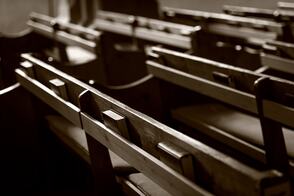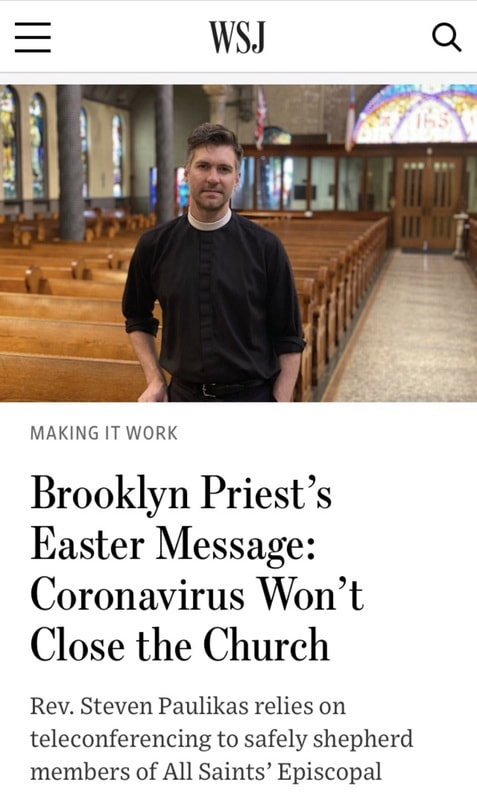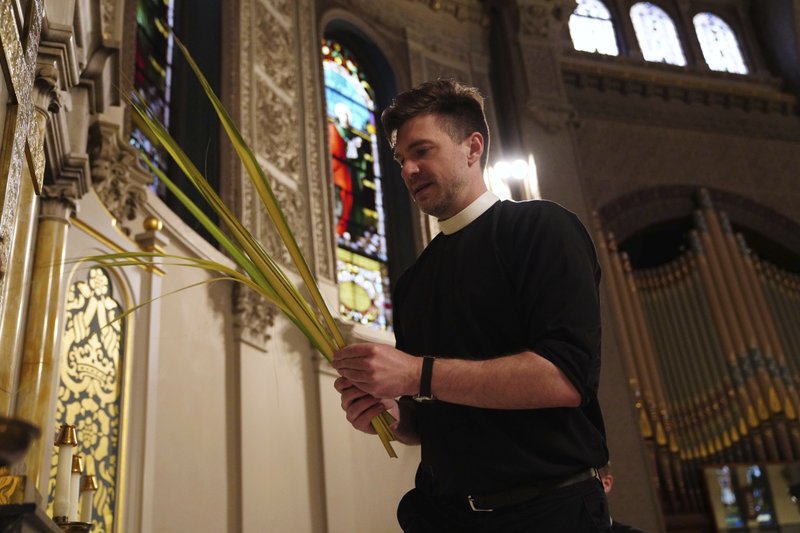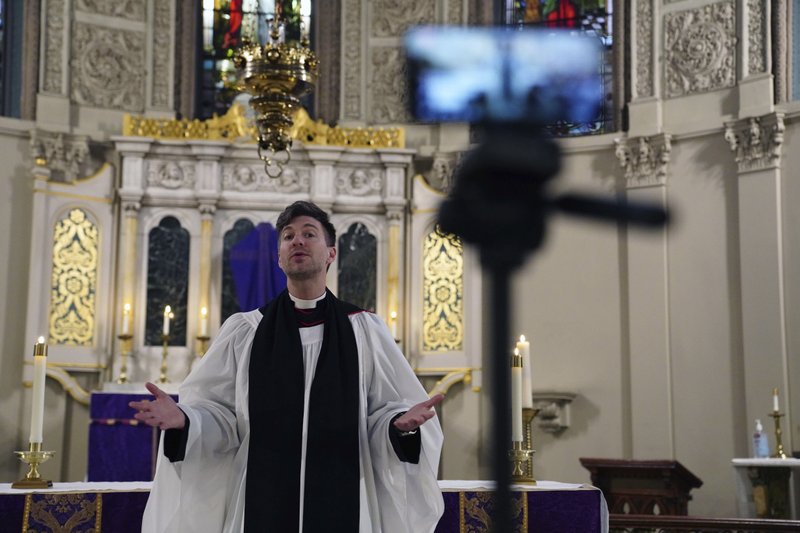|
The void created by this crisis may be an unexpected gift. By Steven Paulikas Mr. Paulikas is an Episcopal priest. April 11, 2020 https://www.nytimes.com/2020/04/11/opinion/coronavirus-Easter-sermon.html My church is empty this Easter. In lieu of greeting the usually joyful parishioners this day, my clergy colleague and I celebrate the ancient rites of our religion six feet apart from each other, as an iPhone live-streams to self-isolated viewers at home. Like so much else in this bizarre time, the emptiness is foreign and unsettling. Yet we all know the urgency of this disruption. The church, like every other gathering place, has emptied itself so that we may live. The images of empty public spaces around the world are shocking outward signs that reflect the interior emptiness so many feel right now. Millions are being deprived of the chance to work, socialize and support one another in person. Physically isolated and emptied of our usual lives, we are being forced to face ourselves in a way that few alive today ever have before. Yet the void created by this crisis may be an unexpected gift. This emptiness presents to us a mystical and uncluttered view of life as we have been living it until a few weeks ago. Life will never be the same. Each day, it becomes more apparent that this is a once-in-a-lifetime chance to consider a fundamental question about the spirit and morality of our way of living: Having emptied ourselves, what do we really want to fill our world with once it is time to rebuild? Now on Sundays as I look out over a field of silent pews, I am reminded that self-emptying is, in fact, a divine virtue. Christian tradition calls it kenosis, the Greek word taken from the famous passage of Paul’s Letter to the Philippians, in which he writes, “Your attitude should be the same as Christ Jesus, who did not regard equality with God as something to be exploited, but emptied himself.” Early Christian thinkers viewed Jesus’ kenosis is a sign of divine supreme power, not the loss of it. The sight of Jesus’ empty tomb was the first sign of his resurrection, believed by Christians to be God’s greatest act. Now that I have adjusted somewhat to the emptiness, I find myself keeping vigil with the opportunity of this time, hoping that something better will be on the other side. The Christian contemplative Cynthia Bourgeault writes that we can emulate Jesus’ self-emptying love in our own lives by practicing letting go of the things, thoughts and feelings we cling to. This insight is more often associated with other religious and spiritual traditions. The Tao Te Ching teaches that the usefulness of the clay vessel lies in its empty hollowness. Mahayana Buddhists use the spiritual discipline of meditation to cultivate an acceptance of emptiness, or sunyata, using the famous Heart Sutra: “Emptiness is form, form is emptiness.” The lesson transcends religious divides; emptiness is not something to fear but to explore as a spiritual reality that leads to detachment from self-interest and greater compassion for the world. It is notable that the most dangerous places in America right now are the ones filled with people we are refusing the right of empty space. In New York, Gov. Andrew Cuomo has used his surging popularity amid the crisis as an occasion to roll back bail reform even as the virus is endangering prisoners and prison workers. The 34,000 people held in ICE detention centers are “sitting ducks” for infection, according to experts. The hypocrisy of homelessness in the world’s wealthiest country is being laid bare. Similarly, workers in dozens of Amazon warehouses rushing to fulfill the orders of millions of quarantined Americans have tested positive for the virus, yet the company has given them no viable option to stay at home. I have contemplated this news in the sad and persistent knowledge that, as a consumer, I, too, am entangled in a morally corrupt economic web that holds together all these injustices. What does it say about our economy that it depends on the labor of people whose lives we are willing to sacrifice? Do we want to continue participating in an exhausting economic system that crumbles the instant it is taken out of perpetual motion? And what is the virtue of a desire for constant accumulation of wealth and goods, especially when they come at the cost of collective welfare and equality? These are not just policy questions. They are spiritual concerns that come into view with sharp clarity in the emptiness around them. If there is anything the collective spiritual insight of millenniums can teach us right now, it is that in addition to the horrors of this current state of emptiness, there is also life to be discovered in this moment. The absence left by the virus’s victims is an unspeakable loss, and the lockdowns and quarantine orders are causing untold suffering that will have the biggest impact on those with the fewest resources. But for those who are healthy and patiently waiting, this space — physical, psychological, social and spiritual — can hold unexpected promise. This is a powerful moment in human history in which we can examine, individually and collectively, the unnecessary decadence and cruelty of our contemporary society that we have accepted without sufficient scrutiny. We don’t yet need detailed plans for the future. For now, we can simply examine the emptiness of this disrupted life and take note of the ways in which we might strive to make it superior to what we had before. Sitting with these questions now will determine what we are willing to accept once this crisis is over. Having tasted a simpler life, perhaps we will shift our values and patterns. Having seen the importance of community, maybe we will invest more in the well-being of the collective and not just the individual. Having seen the suffering of others anew, we may find it impossible to ignore it in the future. And having seen the ease with which the forces Paul called the “powers and principalities” can mobilize to defend entrenched economic interests, maybe — just maybe — we as a people will feel empowered to demand the same urgency of action on our planet’s climate, domestic and global poverty, the health and education of all people, and the myriad pressing problems for which future generations will judge us harshly for tolerating. The emptiness of this moment is incredibly powerful. Pope Francis has said, “Let us not lose our memory once all this is past, let us not file it away and go back to where we were.” Life will not be the same next Easter and Passover. Once the world opens back up, we can choose to fill it with the wisdom and insight gained from these weeks — or allow it to be filled with horrors that are even worse than what we had before. The choice will be ours. Steven Paulikas is an Episcopal priest and rector of All Saints’ Church in Park Slope, Brooklyn. The Times is committed to publishing a diversity of letters to the editor. We’d like to hear what you think about this or any of our articles. Here are some tips. And here’s our email: [email protected]. Follow The New York Times Opinion section on Facebook, Twitter (@NYTopinion) and Instagram.
0 Comments
April 10, 2020
Veronica Dagher for the WSJ On a typical Sunday morning, Rev. Steven Paulikas stands on the front steps of the Brooklyn church he has been leading for almost nine years, shaking hands and hugging congregants. In the age of coronavirus, however, this practice—like many others—has been turned inside out. Recently, the 41-year-old rector of All Saints’ Episcopal Church has stood alone on those steps, his gaze occupied by the crisis enveloping New York City. A refrigerated white semi-truck serving as a temporary morgue has been set up across the street by neighboring NewYork-Presbyterian Brooklyn Methodist Hospital. “The morgue truck is the daily shadow of death cast on to the church,” Father Paulikas said, echoing the sentiments of Psalm 23. He frequently prays for the deceased, their loved ones and the health-care workers serving on the front lines, some of whom are members of his parish. Those prayers are often said as sirens blare in the background. On Sunday, Father Paulikas will celebrate Easter at the end of an unusual Holy Week. The faithful are sheltering in place, so he plans to preside over Mass in an empty church. The liturgy and sermon will be delivered into the lens of an iPhone 11 mounted on a tripod that assistant priest Rev. Spencer Cantrell borrowed from his roommate. Father Paulikas and Father Cantrell now routinely follow up their online services by walking to the church’s garden. There, sitting 6 feet apart and wearing masks, they are available to speak with anyone who wants prayer or conversation at a safe distance. Read full Wall Street Journal article here AP STORY FEATURING FATHER STEVE
Virus alters Holy Week celebration worldwide, not the spirit Many pastors are pondering their upcoming Easter sermons, including the Rev. Steven Paulikas of All Saints Episcopal Church in Brooklyn. His sermon will be transmitted online but delivered in an empty church. “It’s started me thinking about the empty tomb,” he said, referring to the biblical account of Christ’s resurrection after his crucifixion. “That emptiness was actually the first symbol of this new life,” Paulikas said.
Virus forces religions to improvise, isolate for the holidays All Saints' Church in the news...again! Learn the ways religious institutions are adapting to the social restrictions as Holy Week approaches. You can read the whole article here. |
Archives
June 2023
Categories
All
|





 RSS Feed
RSS Feed